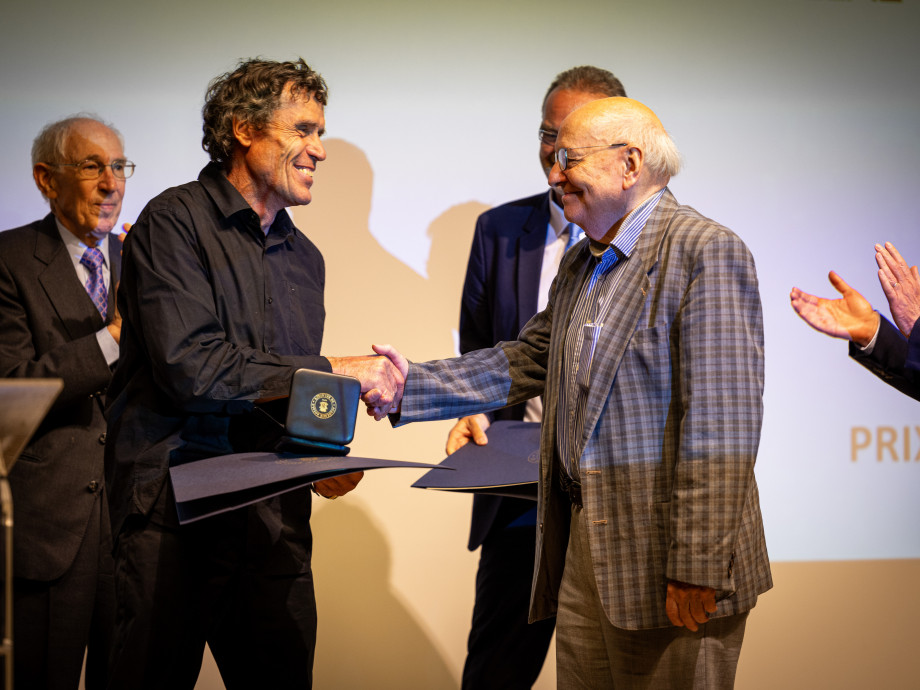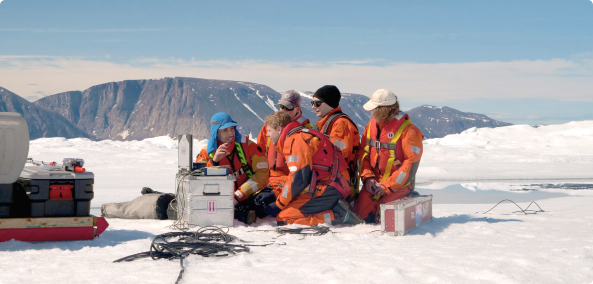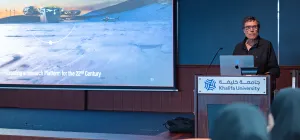Alain Hubert Awarded Prestigious Belgica Prize at Ceremony in Brussels

At a ceremony held the afternoon of Monday, June 10th at The Royal Academy of Sciences of Belgium, Alain Hubert, Founder and President of the International Polar Foundation, received the prestigious Belgica Prize alongside French glaciologist Professor Jérôme Chappellaz.
The ceremony took place in front of a full room in the auditorium at the Royal Academy. Both laureates were introduced by members of the Royal Academy:
After both Alain Hubert and Professor Chappellaz received their medals from the Academy, both laureates gave presentations about their work. First, Professor Chappellaz spoke about his decades-long research tracking methane (one of the most powerful greenhouse gases) in Earth’s atmosphere in his work researching atmospheric gases trapped in ice cores taken at the poles. Afterwards, Alain Hubert recounted how his polar expeditions inspired him to establish the International Polar Foundation and to build the world’s first zero-emission polar research station, the Princess Elisabeth Antarctica.
“The Princess Elisabeth Antarctica is not only a first-of-its-kind research station, which has welcomed scientists from Belgium and internationally, but it also forces us to rethink our relationship with energy,” he stated during his acceptance speech.
The ceremony ended with a memorable 15-minute film that highlighted all of the research projects that have taken place at the Princess Elisabeth Antarctica over the last 17 years it has been operating.
The entire event was recorded and will be made available on the Academy’s website in the coming weeks.
“The Class of Sciences at the Royal Academy is very happy to award the Belgica Prize to Professor Jérôme Chappellaz and Alain Hubert,” commented the Academy. “In this the 125th anniversary year of the overwintering of the Belgica in Antarctica, we wanted to also recognise a modern explorer who has contributed so much to polar research, not only to the Belgian scientific community, but also to the international scientific community.”
The prestigious Belgica Prize is awarded every five years to persons who have made exceptional contributions to polar science during their careers.
Alain Hubert was awarded the prize in recognition of his record-breaking expeditions to the poles, realising the world’s first zero-emission polar research station, the Princess Elisabeth Antarctica, and helping to establish important scientific research programmes at this groundbreaking station.
The construction of the Princess Elisabeth Antarctica has breathed new life into Belgian polar research. The zero-emission station not only significantly reduces the environmental footprint of conducting scientific research in Antarctica, but it also regularly attracts world-class scientists from both Belgium and around the world, working in close collaboration to better understand our planet and its climate in fields such as glaciology, atmospheric sciences, biology, and the geosciences.
“It has been an honour and a privilege to have been able to contribute to the tradition of Belgian polar exploration and international polar research begun by Adrien de Gerlache, and to have helped Belgian polar researchers to benefit from a platform that fully exhibits their very considerable scientific prowess,” Mr Hubert commented about receiving the prize.
Dr Jérôme Chappellaz, who is currently affiliated with the EPFL (Ecole polytechnique fédérale de Lausanne) in Switzerland, received the award for his analysis of ice cores from Greenland and Antarctica, which have made it possible for scientists to reconstruct atmospheric methane concentrations over the last 800,000 years.
The EPFL is currently involved in a number of research projects being undertaken at the Princess Elisabeth Antarctica.
This year was the twelfth time the Belgica Prize has been awarded. It was initially established in 1904 by royal statute to commemorate the first overwintering expedition to Antarctica aboard the Belgica research vessel, led by Belgian Navy Lieutenant Adrien de Gerlache de Gomery in 1897-99, which was also the first international research expedition to Antarctica. The first recipients of the prize were members of the Belgica expedition crew and the diverse team of scientists who contributed to the quantity of scientific information collected during that voyage and during the year the ship spent in the sea ice in Antarctica.
Since 1963 the prize has been awarded every five years in recognition of the work of polar scientists active in Antarctica. A variety of researchers from Belgium and other countries have received the prestigious award. Notable winners include the Belgian Antarctic research expedition of 1957-58 (which began construction of Belgium’s King Baudouin research station), Edgard Picciotto (Geologist from the Université libre de Bruxelles who took part in several Belgian and American Antarctic research expeditions in the 1950s and 60s), Claude Lorius (Glaciologist and former President of the Scientific Committee on Antarctic Research), David John Drewry (former Director of the British Antarctic Survey), Dominique Raynaud (Glaciologist at the Centre national de recherche scientifique in France and 2007 Nobel Peace Prize winner), and Thomas Stocker (climatologist at the University of Bern).
Download photos from the ceremony here.
The International Polar Foundation (IPF):
The IPF is a private law foundation with a public service mandate. It was set up in 2002 by Alain Hubert and the leading climate scientist André Berger and the glaciologist Hugo Decleir. Its remit is to support international polar scientific research and to disseminate the important findings to the public and decision makers.
The IPF was behind the creation of the Princess Elisabeth Antarctica station, which was officially inaugurated in 2007 as the first zero-emissions station. PEA re-established a Belgian presence in Antarctica at the service of science and concerned citizens increasingly facing climate and environmental challenges. Every year, the Princess Elisabeth Antarctica station hosts scientists from all over the World.
Press contacts:
Joseph Cheek
Project Manager & Communications
joseph.cheek@polarfoundation.org
P: +32 (0) 2 520 34 40
Nicolas Van Hoecke
Managing Director
nicolas.vanhoecke@polarfoundation.org
P: +32 (0) 2 520 34 40
M: +32 (0) 478 90 71 76
Follow us:
Facebook: facebook.com/intpolarfoundation
Instagram: instagram.com/international_polar_foundation/
Tiktok: @int.polarfoundation
Twitter: twitter.com/polarfoundation
LinkedIn: https://be.linkedin.com/company/international-polar-foundation
Visit us:
https://discover.polarfoundation.org/
http://www.polarfoundation.org/
http://www.antarcticstation.org
http://www.arcticfutures.org
_______________________________
Version française
Alain Hubert reçoit le prestigieux Prix Belgica lors d'une cérémonie à Bruxelles
Bruxelles, le 11 juin 2024
Lors d'une cérémonie qui s'est tenue l'après-midi du lundi 10 juin à l'Académie royale des sciences de Belgique, Alain Hubert, fondateur et président de la Fondation polaire internationale, a reçu le prestigieux prix Belgica aux côtés du glaciologue français Jérôme Chappellaz.
La cérémonie s'est déroulée devant une salle pleine dans l'auditorium de l’Académie royale. Les deux lauréats ont été présentés par des membres de l’Académie royale.
Après qu'Alain Hubert et le Professeur Chappellaz aient reçu leurs médailles, les deux lauréats ont présenté leurs travaux. Tout d'abord, le professeur Chappellaz a présenté ses recherches de plusieurs décennies sur le méthane - le gaz à effet de serre le plus puissant - dans l'atmosphère terrestre, à partir de recherches sur les gaz atmosphériques piégés dans des carottes de glace prélevées aux pôles. Ensuite, Alain Hubert a raconté comment ses expéditions polaires l'ont inspiré à créer la Fondation Polaire Internationale et à construire la première station de recherche polaire zéro émission au monde, la Princess Elisabeth Antarctica.
"La station Princess Elisabeth Antarctica est non seulement une station de recherche unique en son genre, qui a accueilli des scientifiques belges et internationaux, mais elle nous oblige également à repenser notre rapport à l'énergie", a-t-il déclaré lors de son discours de remerciement.
La cérémonie s'est terminée par un film mémorable de 15 minutes mettant en lumière tous les projets de recherche menés au Princess Elisabeth Antarctica au cours des 17 dernières années d'exploitation.
L'intégralité de la cérémonie a été enregistrée et sera disponible sur le site Internet de l'Académie dans les semaines à venir.
« La Classe des Sciences de l’Académie royale de Belgique est très heureuse de décerner le prix de la Belgica au Professeur Jérôme Chappellaz et à Alain Hubert », a commenté l'Académie. « En ce 125e anniversaire de l’hivernage de la Belgica en Antarctique, nous voulions également récompenser un « explorateur » moderne, qui a tant contribué à la recherche polaire, non seulement pour la communauté scientifique belge, mais aussi pour la communauté scientifique internationale.»
Le prestigieux Prix Belgica est décerné tous les cinq ans à des personnes qui ont apporté une contribution exceptionnelle à la science polaire au cours de leur carrière.
Alain Hubert a reçu ce prix en reconnaissance de ses expéditions record aux pôles, de la réalisation de la première station de recherche polaire à zéro émission au monde, le Princess Elisabeth Antarctica, et de sa contribution à la mise en place d'importants programmes de recherche scientifique dans cette station révolutionnaire.
La construction du Princess Elisabeth Antarctica a donné un nouveau souffle à la recherche polaire belge. La station zéro émission réduit non seulement considérablement l'empreinte environnementale de la recherche scientifique en Antarctique, mais elle attire également régulièrement des scientifiques de renommée mondiale de Belgique et du monde entier, travaillant en étroite collaboration pour mieux comprendre notre planète et son climat dans des domaines tels que la glaciologie, les sciences atmosphériques, la biologie et les géosciences.
« Ce fut un honneur et un privilège d'avoir pu contribuer à la tradition de l'exploration polaire belge et de la recherche polaire internationale commencée par Adrien de Gerlache, et d'avoir aidé les chercheurs polaires belges à bénéficier d'une plateforme qui met pleinement en valeur leurs prouesses scientifiques très considérables », a commenté M. Hubert à propos de la réception du prix.
Le Dr Jérôme Chappellaz, actuellement affilié à l'EPFL (Ecole polytechnique fédérale de Lausanne) en Suisse, a reçu le prix pour son analyse des carottes de glace du Groenland et de l'Antarctique, qui ont permis aux scientifiques de reconstituer les concentrations atmosphériques de méthane au cours des 800 000 dernières années.
L'EPFL est actuellement impliquée dans un certain nombre de projets de recherche menés à la station polaire Princess Elisabeth Antarctica.
Cette année, c'était la douzième fois que le Prix Belgica était décerné. Il a été initialement créé en 1904 par un statut royal pour commémorer la première expédition d'hivernage en Antarctique à bord du navire de recherche Belgica, dirigé par le lieutenant de la marine belge Adrien de Gerlache de Gomery en 1897-99, qui était également la première expédition internationale de recherche en Antarctique. Les premiers récipiendaires du prix ont été les membres de l'équipage de l'expédition Belgica et l'équipe diversifiée de scientifiques qui ont contribué à la quantité d'informations scientifiques recueillies au cours de ce voyage et de l'année que le navire a passée dans la banquise en Antarctique. Depuis 1963, le prix est décerné tous les cinq ans en reconnaissance du travail des scientifiques polaires actifs en Antarctique.
Depuis 1963, le prix est décerné tous les cinq ans en reconnaissance du travail des scientifiques polaires actifs en Antarctique. Divers chercheurs de Belgique et d'autres pays ont reçu ce prix prestigieux. Parmi les lauréats notables, citons l'expédition belge de recherche antarctique de 1957-58 (qui a commencé la construction de la station de recherche du roi Baudouin de Belgique), Edgard Picciotto (géologue de l'Université libre de Bruxelles qui a participé à plusieurs expéditions de recherche antarctique belges et américaines dans les années 1950 et 60), Claude Lorius (glaciologue et ancien président du comité scientifique pour la recherche antarctique), David John Drewry (ancien directeur du British Antarctic Survey), Dominique Raynaud (glaciologue au Centre national de recherche scientifique en France et prix Nobel de la paix 2007) et Thomas Stocker (climatologue à l'Université de Berne).
Téléchargez les photos de la cérémonie ici.
La Fondation Polaire Internationale (IPF) :
L’IPF est une fondation d’utilité publique créée en 2002 par Alain Hubert et le climatologue renommé André Berger et le glaciologue Hugo Decleir. La fondation a comme mission le soutien de la recherche scientifique polaire internationale et la dissémination d’importantes découvertes au grand public et décideurs.
L’IPF est également à l’initiative de la station antarctique Princess Elisabeth Antarctica, inaugurée en 2007 en tant que première et - à ce jour - seule station « zéro émission », en vue de préserver la présence antarctique belge et d’en poursuivre l’ambition au service de la science et des citoyens confrontés aux défis climatiques et environnementaux. La station belge Princess Elisabeth Antarctica accueille chaque année de nombreux scientifiques de toutes nationalités.
Contacts presse :
Joseph Cheek
Project Manager & Communications
joseph.cheek@polarfoundation.org
P: +32 (0) 2 520 34 40
Nicolas Van Hoecke
Managing Director
nicolas.vanhoecke@polarfoundation.org
P: +32 (0) 2 520 34 40
M: +32 (0) 478 90 71 76
Follow us:
Facebook: facebook.com/intpolarfoundation
Instagram: instagram.com/international_polar_foundation/
Tiktok: @int.polarfoundation
Twitter: twitter.com/polarfoundation
LinkedIn: https://be.linkedin.com/company/international-polar-foundation
Visit us:
https://discover.polarfoundation.org/
http://www.polarfoundation.org/
http://www.antarcticstation.org
http://www.arcticfutures.org
Notre site :
http://www.polarfoundation.org/
___
Nederlandse versie
Alain Hubert ontvangt prestigieuze Belgica Prijs tijdens uitreiking in Brussel
Brussel, 11 juni 2024
Tijdens een ceremonie op maandagmiddag 10 juni in de Koninklijke Academie voor Wetenschappen van België ontving Alain Hubert, oprichter en voorzitter van de International Polar Foundation, samen met de Franse glacioloog professor Jérôme Chappellaz de prestigieuze Belgica-prijs.
De ceremonie vond plaats voor een volle zaal in het auditorium van de Koninklijke Academie. Beide laureaten werden geïntroduceerd door leden van de Koninklijke Academie.
Nadat zowel Alain Hubert als professor Chappellaz hun medailles in ontvangst hadden genomen, gaven beide laureaten presentaties over hun werk. Ten eerste sprak professor Chappellaz over zijn decennialange onderzoek naar het opsporen van methaan – een van de krachtigste broeikasgassen – in de atmosfeer van de aarde, door onderzoek te doen naar atmosferische gassen die gevangen zitten in ijskernen die aan de polen zijn onttrokken. Vervolgens vertelde Alain Hubert in zijn presentatie hoe zijn poolexpedities hem inspireerden om de International Polar Foundation op te richten en om het eerste emissievrije poolonderzoeksstation ter wereld te bouwen, het Princess Elisabeth Antarctica.
"De Princess Elisabeth Antarctica onderzoeksbasis is niet alleen het eerste in zijn soort, dat Belgische en internationale wetenschappers heeft verwelkomd, maar het dwingt ons ook om onze relatie met energie te heroverwegen", verklaarde hij tijdens zijn dankwoord.
De ceremonie werd afgesloten met een gedenkwaardige film van 15 minuten waarin alle onderzoeksprojecten werden belicht die hebben plaatsgevonden op de Princess Elisabeth Antarctica in de afgelopen 17 jaar.
De gehele ceremonie is opgenomen en zal de komende weken beschikbaar zijn op de website van de Academie.
“De Wetenschapsklas van de Koninklijke Academie van België is zeer verheugd de Belgica Prijs toe te kennen aan professor Jérôme Chappellaz en Alain Hubert. Op deze 125ste verjaardag van de overwintering van de Belgica op Antarctica wilden we ook een moderne "ontdekkingsreiziger" belonen, die zoveel heeft bijgedragen aan het poolonderzoek, niet alleen voor de Belgische wetenschappelijke gemeenschap, maar ook voor de internationale wetenschappelijke gemeenschap.”
De prestigieuze Belgica Prijs wordt om de vijf jaar uitgereikt aan personen die tijdens hun carrière een uitzonderlijke bijdrage hebben geleverd aan de poolwetenschap.
Alain Hubert kreeg de prijs als erkenning voor zijn recordbrekende expedities naar de polen, de realisatie van 's werelds eerste emissievrije poolonderzoeksstation, de Princess Elisabeth Antarctica, en het helpen opzetten van belangrijke wetenschappelijke onderzoeksprogramma's op dit baanbrekende station.
De bouw van de Princess Elisabeth Antarctica heeft het Belgische poolonderzoek nieuw leven ingeblazen. Het emissievrije station verkleint niet alleen de ecologische voetafdruk van het uitvoeren van wetenschappelijk onderzoek op Antarctica aanzienlijk, maar trekt ook regelmatig wetenschappers van wereldklasse uit zowel België als de rest van de wereld aan, die nauw samenwerken om onze planeet en haar klimaat beter te begrijpen op gebieden als glaciologie, atmosferische wetenschappen, biologie en geowetenschappen.
"Het is een eer en een voorrecht om bij te dragen aan de traditie van de Belgische poolexploratie en het internationale poolonderzoek die begonnen is door Adrien de Gerlache, en om de Belgische poolonderzoekers te hebben geholpen om te profiteren van een platform dat hun zeer aanzienlijke wetenschappelijke prestaties volledig tentoonstelt", aldus de heer Hubert bij het in ontvangst nemen van de prijs.
Dr. Jérôme Chappellaz, momenteel verbonden aan EPFL (Ecole Polytechnique Fédérale de Lausanne) in Zwitserland, ontving de prijs voor zijn analyse van ijskernen uit Groenland en Antarctica, waardoor wetenschappers de atmosferische methaanconcentraties van de afgelopen 800.000 jaar hebben kunnen reconstrueren.
EPFL is momenteel betrokken bij een aantal onderzoeksprojecten aan het Princess Elisabeth Antarctica onderzoeksstation.
Dit jaar werd de Belgicaprijs voor de twaalfde keer uitgereikt. Het werd oorspronkelijk opgericht in 1904 bij koninklijk statuut ter herdenking van de eerste overwinteringsexpeditie naar Antarctica aan boord van het onderzoeksschip Belgica, geleid door luitenant van de Belgische marine Adrien de Gerlache de Gomery in 1897-99, wat ook de eerste internationale onderzoeksexpeditie naar Antarctica was. De eerste laureaten waren leden van de bemanning van de Belgica-expeditie en het diverse team van wetenschappers die hebben bijgedragen tot de hoeveelheid wetenschappelijke informatie die tijdens die reis en tijdens het jaar dat het schip in het zee-ijs op Antarctica heeft doorgebracht, is verzameld. Sinds 1963 wordt de prijs om de vijf jaar uitgereikt als erkenning voor het werk van poolwetenschappers die actief zijn op Antarctica.
Sinds 1963 wordt de prijs om de vijf jaar uitgereikt als erkenning voor het werk van poolwetenschappers die actief zijn op Antarctica. Verschillende onderzoekers uit binnen- en buitenland hebben de prestigieuze prijs in ontvangst mogen nemen. Opmerkelijke winnaars zijn onder meer de Belgische Antarctische onderzoeksexpeditie van 1957-58 (die begon met de bouw van het Belgische Koning Boudewijn-onderzoeksstation), Edgard Picciotto (geoloog van de Université libre de Bruxelles die deelnam aan verschillende Belgische en Amerikaanse Antarctische onderzoeksexpedities in de jaren 1950 en 1960), Claude Lorius (glacioloog en voormalig voorzitter van het Wetenschappelijk Comité voor Antarctisch Onderzoek), David John Drewry (voormalig directeur van de British Antarctic Survey), Dominique Raynaud (glacioloog aan het Centre national de recherche scientifique in Frankrijk en winnaar van de Nobelprijs voor de Vrede in 2007) en Thomas Stocker (klimatoloog aan de Universiteit van Bern).
Download hier foto's van de ceremonie.
De International Polar Foundation (IPF):
De IPF is een privaatrechtelijke stichting van openbaar nut. De stichting werd in 2002 opgericht door Alain Hubert en toonaangevende klimaatwetenschapper André Berger en de glacioloog Hugo Decleir. De missie van IPF bestaat erin internationaal poolwetenschappelijk onderzoek te steunen en belangrijke bevindingen te verspreiden onder het publiek en besluitvormers.
De stichting ligt ook aan de basis van het Princess Elisabeth Antarctica-station dat in 2007 werd ingehuldigd als het eerste en tot op heden enige "zero emissie"-station, met het oog op het behoud van de Belgische aanwezigheid op Antarctica ten dienste van burgers die steeds meer worden geconfronteerd met klimaat- en milieu-uitdagingen. Het Belgische Princess Elisabeth-station Antarctica verwelkomt jaarlijks vele wetenschappers van alle nationaliteiten.
Pers contacten:
Joseph Cheek
Project Manager & Communications Manager
joseph.cheek@polarfoundation.org
P: +32 (0) 2 520 34 40
Nicolas Van Hoecke
Managing Director
nicolas.vanhoecke@polarfoundation.org
P: +32 (0) 2 520 34 40
M: +32 (0) 478 90 71 76
Volg ons:
Facebook: facebook.com/intpolarfoundation
Instagram: instagram.com/international_polar_foundation/
Tiktok: @int.polarfoundation
Twitter: twitter.com/polarfoundation
LinkedIn: https://be.linkedin.com/company/international-polar-foundation
Bezeok ons:
https://discover.polarfoundation.org/
http://www.polarfoundation.org/
http://www.antarcticstation.org
http://www.arcticfutures.org






















